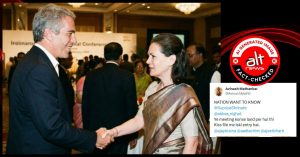In an advertisement for Abu Dhabi tourism, Bollywood actress Deepika Padukone was recently seen donning the abaya for a shot in the forecourt of the Sheikh Zayed Grand Mosque Centre. Stills from the advertisement, where she was cast alongside her husband, actor Ranveer Singh, immediately went viral with many from the Right-wing ecosystem calling her out for her apparent ‘hypocrisy’.
View this post on Instagram
Several users were quick to point out that the couple had named their daughter with a Muslim-sounding name, hinting at their apparent appeasement towards the community. @KreatelyMedia, a Right-wing influencer who peddles communal propaganda on a regular basis, was one of them.
Husband name – Ranveer Singh
Wife name – Deepika PadukoneChild name – Dua pic.twitter.com/R0VxKtlSLN
— Kreately.in (@KreatelyMedia) October 9, 2025
One user drew a comparison between former Union Minister Smriti Irani, who was pictured wearing a saree outside the Masjid al-Haram in Makkah, Saudi Arabia, and Padukone. It is worth noting that the latter was pictured inside the mosque, where women are generally required to cover their heads with a scarf or hijab upon entering.
Tell me who is an empowered women?
In Mecca Saudi😀 In UAE 🤡 pic.twitter.com/GBbfcShucw
— Sarvagraharoopini (@GurorangriPadme) October 9, 2025
Comparisons Drawn to Padukone’s ‘My Choice’ Campaign in 2015
In 2015, Deepika Padukone collaborated with film director Homi Adajania for Vogue India’s ‘My Choice’ campaign. The 2:34-minute video featured Padukone, alongside 99 other women, who delivered a powerful message championing women’s rights and empowerment. Several lines from the video stirred controversy for the Bollywood A-lister at the time.
The campaign came under scrutiny again after the Abu Dhabi ad was aired. At one point during the 2015 video, Padukone said, “The bindi on my forehead, the ring on my finger, adding your surname to mine — they are all ornaments, they can be replaced. My love for you is not, so treasure that.” Several users referred to this while remarking that when it came to entering a mosque, Padukone was ‘forced’ to don a headscarf, while wearing the bindi remains a choice.
“Jab Hindu sanskriti ki aati hai, toh woh ek byaktigat chunav hai lekin jab baat Islam ki aati hai, toh woh koi choice nahi…” remarked The Jaipur Dialogues’ Sanjay Dixit in a clip. (Translation: When it comes to Hindu culture, it’s a personal choice, but when it comes to Islam, it’s not a choice)
Deepika Didi, Abu Dhabi में हिजाब Cultural Compliance हैं.. ना की Respect.. इतना नहीं समझते 🙄 pic.twitter.com/O7AzA7r0L0
— The Jaipur Dialogues (@JaipurDialogues) October 8, 2025
Since the concept of personal choice and consent seems to have been lost on many of the Hindutva advocates, it is imperative to state that choosing to appear in the ad is indeed Padukone’s personal choice. Besides, an ad is a scripted video made to promote an idea or a product. What costumes an actor puts on in an ad depends on the makers of the ad and questions of verisimilitude. In most cases, the actor has little say in these matters. The social media posts that pass a verdict on Deepika’s ‘choices’ based on her attire in the ad seem to be missing this basic point.
Criticism over her wearing a headscarf in the ad also exposes a persistent double standard: When women navigate Islamic spaces, their compliance is often framed by Hindutva supremacists as coercion, while their engagement with Hindu symbols or attire is celebrated as personal expression. Covering the head or putting on a particular kind of attire while entering a place of worship are common practice across religions.
Below are a few X posts that reflect (Archives- 1, 2, 3, 4)
The criticism from The Vogue ad was then translated into criticism regarding Padukone’s appearance at a protest rally in Jawaharlal Nehru University. On January 7, 2020, Padukone had visited the campus in New Delhi to express solidarity with students protesting against a violent attack on their campus. The assault, which occurred on January 5, involved masked assailants allegedly linked to the Akhil Bharatiya Vidyarthi Parishad (ABVP). At the time, Padukone had faced a flurry of hate online. Her visit to the campus shortly before her film Chhapaak was released led to a boycott campaign against the film.
This time too, several people shared her images from the protest rally, trying to insinuate that Padukone’s politics does not align with that of the ruling party. (Archive)
Deepika Padukone’s downfall in picture/video
1) No one noticed
2) Everyone noticed
3) Her downfall is complete. pic.twitter.com/F7YXO9TvVI— Tathvam-asi (@ssaratht) October 8, 2025
An X user named advocate Amita Sachdeva amplified the sentiment during a segment on NDTV. “Indian Tourism will never approach her because when it comes to the bindi, she says it’s her freedom not to wear one; when it comes to the gang that says “Bharat tere tukde honge,” she supports the Tukde Tukde Gang; and when it comes to any law proposed by the Indian Government, she supports those who oppose it,” she said. (Archive)
Selective Support and Cultural Sensitivity: A Matter of Responsibility
We never said that Deepika insulted any religion. Our only point is that she should show respect towards every culture and promote it.
Wearing a hijab or abaya is her personal and professional choice, as she… pic.twitter.com/b5yhZH9JpN
— Amita Sachdeva, Advocate (@SachdevaAmita) October 9, 2025
It is to be noted that on October 10, the World Mental Health Day, the Union ministry of health and family welfare appointed Deepika Padukone as its first-ever mental health ambassador.
View this post on Instagram
Independent journalism that speaks truth to power and is free of corporate and political control is possible only when people start contributing towards the same. Please consider donating towards this endeavour to fight fake news and misinformation.




